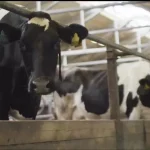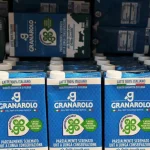
“Strengthening Pennsylvania dairy means investing in its future,” said Redding. “Early on, Governor Wolf prioritized dairy investments to safeguard family farms and ensure dairy remained a major economic driver in the commonwealth.
The Wolf Administration’s investments over the past seven years have fueled innovation, created jobs and strengthened the industry’s competitiveness. PA dairy farmers are feeding families and fueling the economy. These investments are both in dairy industry but also in the future of our commonwealth.”
Pennsylvania ranks 7th nationally in total milk production, with nearly 520,000 cows producing more than 10.6 billion pounds of milk annually. The industry supports 53,300 jobs and contributes $14.1 billion to the state’s economy. In recent years, dairy has faced market challenges due to increased costs and changes in supply and demand. Recognizing these challenges, Governor Wolf has invested more than $50 million since 2015 to better position Pennsylvania’s dairy industry for the future.
In 2015, the Wolf Administration launched the Dairy Development Program. The program convened dairy economists, industry, the PA Department of Agriculture and the Center for Dairy Excellence to strategize a positive path forward for Pennsylvania dairy, creating a five-part 2017 Pennsylvania Dairy Study that outlined strategic recommendations to strengthen the industry.
Putting recommendations into action, the administration sought bipartisan support to appropriate $15 million to the PA First Industries Fund, providing incentives to dairy processors to relocate or expand operations in Pennsylvania. The Dairy Development Plan also prompted the PA Dairy Investment Program, investing $10 million in 75 projects, over the course of 2018 and 2019 years, to strengthen processing and on-farm dairy investments, funding value-added processing, research and development, marketing and organic transitions projects.
Turner’s Dairy received nearly $360,000 from the Pennsylvania Dairy Investment Program to expand their processing facility and to fund research to develop a new ready-to-drink dairy-based coffee beverage.
In June, Governor Wolf signed Act 62, offering milk sell by date and best by date labeling to dairy processors. Inspired by the Dairy Future Commission recommendations and introduced by Senator Vogel as Senate Bill 434, Act 62 amends Title 3 of the Pennsylvania Consolidated Statutes, in food protection, providing for milk sell by date and best by date labeling. Prior to the amendment, milk followed a 17-day milk code, which caused viable milk to go to waste as food safety practices extend milk shelf beyond 17 days.
Milk code is not considered a food safety issue by FDA or state regulatory authorities.
“The enactment of Act 62 levels the playing field for Pennsylvania’s dairy industry, as it enables better competition with surrounding states, while also reducing food waste,” Vogel said. “Seeing this milestone reached, as dairy processers begin to utilize this science-based approach to labeling milk, is truly a victory for the Commonwealth.”
Established in 1930, Turner’s Dairy made serving high-quality, local dairy products to Western Pennsylvania part of their mission. Turner’s partners exclusively with 35 local, family dairy farms within 70 miles of their processing facility. In 2021, Turner’s became the first Pennsylvania dairy to take advantage of Act 62, extending their shelf-life for fresh milk and cream.
“Our Turner team members and local farm partners are the backbone of our business,” sid Chuck Turner Jr., President of Turner Dairy. “Without their hard work and dedication, we would not be able to produce the highest quality milk and dairy products. There is a wonderful sense of purpose in our work; providing great tasting, nutritious food for our community.”
Since 2015, the PA Department of Agriculture has invested more than $8.7 million in the Center for Dairy Excellence to support on-farm grant investments, financial assistance workshops and educational opportunities.
The Wolf Administration also supported Pennsylvania’s dairy industry through unstable markets during the COVID-19 pandemic by funding the $15 million COVID-19 Dairy Indemnity Program for farmers that lost milk and the $5 million dairy allocation to the Pennsylvania Agricultural Surplus System for farmers who donated surplus dairy products to the charitable food system, both funded through Pennsylvania’s Coronavirus, Aid, Relief, and Economic Security (CARES) Act allotment.
For more information on the Wolf Administration’s work to strengthen the resilience of Pennsylvania agriculture, visit agriculture.pa.gov.























